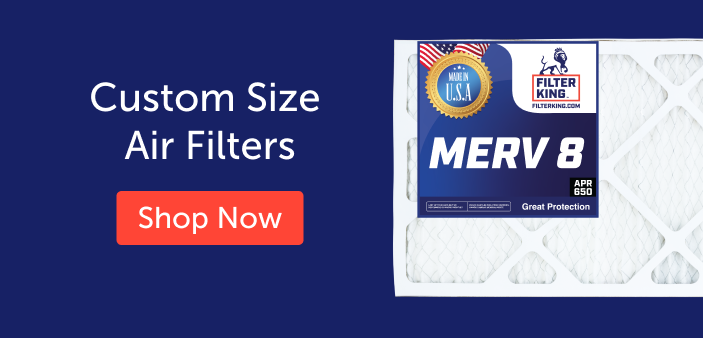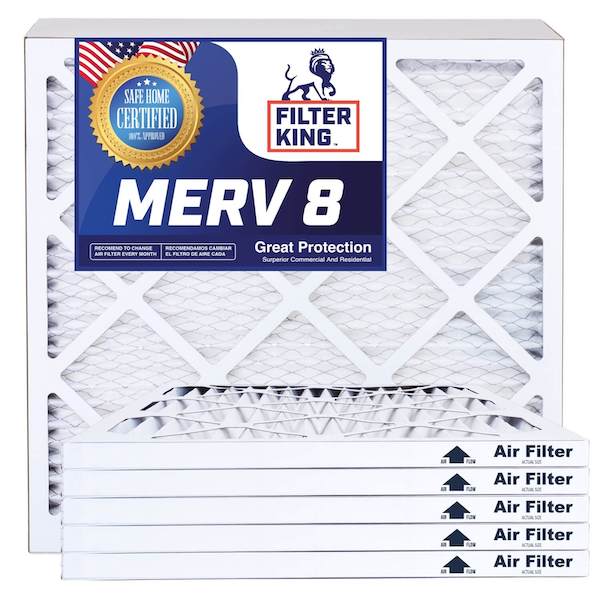How Do Air Filters Work?
Air filters are crucial to any central heating, ventilation and air conditioning (HVAC) system. These thin, porous filters play a significant role in maintaining the cleanliness of any home's ventilation system. For homeowners with a furnace and air conditioner, knowing how your air filters work is critical to keeping your family healthy and your HVAC system running efficiently.
If you’re a homeowner looking for top advice from our air filter experts, you’ve come to the right place. This guide to “How Do Air Filters Work” will cover the nuts and bolts of what you need to know about air filters to keep your home’s air clean.
What is an Air Filter?
An air filter is a porous screen that slots right into the air duct compartment of an HVAC system to filter out bad airborne particles, while still allowing clean circulating air to move through it. Having a filter in your HVAC system cleans the air as it circulates and filters out dust, pollen, mold spores, pet dander and other pollutants.
Air filters use different filtration methods, but they all essentially serve the same basic functions:
- Snaring in elements of smoke, dust and other airborne contaminants to help stop the particles from flowing in your environment
- Protecting the components of your HVAC system from dirt buildup
- Improving indoor air quality
- Reducing allergies and respiratory issues
How Do Air Filters Work?
Air filters work by forcing air to pass through a filter medium like foam, pleated paper or fibrous mesh. These filters fit into pre-made slots inside the air ducts of a home or building’s HVAC system. As the air passes through, particles and contaminants are captured within the filter. The filtration process depends on the specific type of air filter.
But this is not a ‘one and done’ kind of operation. Air filter maintenance is an ongoing household management task for a homeowner. Changing filters every month or two, depending on needs, helps to keep a ventilation system clean consistently over time. This ensures that the air quality within the home or office environment stays at high quality levels.
There are a wide variety of air filters available, from small to large, and with varying measures of filtering strengths. Here are the main types of air filters and how they work:
Mechanical/Pleated Filters
The most common residential air filters are pleated mechanical filters made of cotton, polyester or synthetic fibers. These are often used in a zig-zag pattern. As air flows through the pleated filter, larger particles are captured within the fibers as it blows through the ventilation system.
Small airborne particles get caught in the fibers in the filter. Because the creased pleats increase the filter’s surface area, more airborne particles are captured with these filters.
Electrostatic Air Filters
A different kind of filter is an electrostatic air filter, which functions by trapping airborne particles through the magic of static electricity. As air passes through the filter, particles receive an electric charge. This causes them to stick to oppositely charged fibers in the filter.
If your home, office or other room environment involves particles like smoke, smog and pet dander, electrostatic filters can be very helpful in capturing these very small particles. Keep in mind that you have to recharge the static charge through washing the filters or exposing them to heat.
HEPA Filters
Americans learned more about HEPA (High Efficiency Particulate Air) filters more often in the COVID-19 pandemic, as homeowners rushed to use these filters for their strength. HEPA filters are designed to remove over 99.97% of particles 0.3 microns in size, like dust mites, mold spores, pet dander and smoke.
Fiberglass fibers, arranged randomly in a dense mat, make up the HEPA filters. The fibers are tightly woven and the gaps between them are smaller than most airborne particles. This forces contaminants to become stuck to the filter fibers through diffusion and interception.
Why are Air Filters Important?
Walk into any home, office or facility and you’ll know that air filters are hard at work, filtering out allergens and airborne particles from the air. But this is only part of the function of an air filter making up a vital piece in an overall HVAC system.
Here are some significant contributions made possible by air filters.
Improved Indoor Air Quality
Air filters help to improve air quality, by removing allergens, smoke and airborne illness-causing bacteria, viruses and mold from the air. This is a huge benefit.
For many people who work in offices or other enclosed spaces, breathing in bad air can have a deleterious effect on a person’s overall health, comfort and productivity. Using high-quality air filters from Filter King can go a long way in improving your air quality.
HVAC Protection
Over time, dirt, dust and debris can build up on the components of your HVAC system. Air filters prevent this accumulation by trapping particles before they reach the furnace, coils, blower and ductwork.
Energy Savings
Dirty HVAC components like air conditioner coils have to work harder to function. Cleaning them with air filters improves airflow and increases efficiency. Keeping your system free of debris saves energy and lowers utility bills.
Equipment Longevity
Air filters extend the lifespan of the HVAC equipment and prevent costly repairs or premature breakdowns. By keeping your HVAC components clean, you’ll gain more use from your existing HVAC system and save cash moving ahead.
With all these useful features of air filters, it’s a no brainer to use them well and often. But how often should you change your air filters? Let’s discuss that below!
How Often Should You Change Air Filters?
Changing air filters: some people swear by changing them every month. Others point to the manufacturer’s directions and change them after 3 months. How often you replace your air filters depends on several factors, including the air involved, the space, the frequency of circulating air, and much more. Let’s take a look below at some of the factors involved.
- Filter efficiency - High-performance filters like HEPA models need to be changed more often
- Amount of runtime - Longer runtime means filters collect more particles
- Pets - Homes with shedding pets need more filter changes
- Number of persons - With more people, more contaminants may be created.
- Smokers - Cigarette smoke can clog up air filters more quickly
- Season - Pollen and dust increase in certain seasons
Homeowners should check the air filters every month and replace them when they appear to be noticeably dirty. Replacing clogged filters improves HVAC performance and indoor air quality. Newer HVAC furnaces and systems have automatic indicators that alert you when your filter needs to be switched out.
Using High Quality Air Filters
It’s pretty crucial to use high quality air filters whenever you can. Here’s why.
When an air filter becomes dirty, a blockage can arise, affecting the air flow throughout your home. The dirty filter has accumulated so much dirt, hair, airborne particles and debris. It eventually becomes an overloaded filter that’s so dirty, that the HVAC air system requires extra energy to push the airflow through. This will not only cause your system to work harder, and cost you more money, but it may contribute to a shorter lifespan of your HVAC system, causing you to shell out more money earlier than you expected.
By maintaining a clean air conditioner and using high-quality air filters, you’ll do your part to lower your home’s bills and environmental impact. That’s why it makes sense to maintain your filters to keep the ventilation system working. For that maintenance, look to Filter King’s quality air filters at affordable prices. We carry all types of standard and custom sizes for the average home, including the popular Merv 8 air filter, which is 90% percent effective against airborne particles
When selecting replacement air filters, don't simply choose the cheapest option. Investing in high quality air filters from trusted brands like Filter King provides crucial benefits:
- Superior filtration - Removes more allergens and particles
- Improved airflow - Won't restrict HVAC performance
- Enhanced HVAC protection - Catches more debris and dirt
- Longer filter life - Lasts several months before needing replacement
- Consistent performance - Maintains filtration efficiency over time
Filter King air filters are specifically designed to provide the highest quality filtration for home HVAC systems. Our filters are rigorously tested and pass strict quality certifications. Choose Filter King for healthier indoor air and maximum home comfort. Shop our full range of filters for your needs.

 14x18x1
14x18x1
